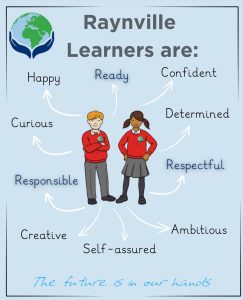Curriculum Overview
Curriculum Intent
At Raynville Academy, we believe that the ‘future is in our hands’ and it is every individual’s responsibility to become the best versions of themselves. Raynville Academy’s curriculum is built around a strong belief that nurture is vital in ensuring that children are ready to access an education they deserve. By cultivating strong relationships, children are able to reach their potential and successfully move onto their next phase of education as well-rounded individuals. To guarantee this happens, our curriculum is built around opportunities to promote children’s confidence, resilience and independence while igniting curiosity, creativity and imagination. Using the National Curriculum as a starting point, we further enhance our broad and balanced curriculum with high-quality visitors, first-hand experiences and out of school activities.
Through our bespoke curriculum offer, our highly skilled staff identify children’s unique qualities and work hard to deliver a curriculum which is lively, fun and engaging, encouraging children to become lifelong learners. At Raynville Academy, no limits are placed on any individuals’ expectations and we work together to overcome all obstacles. The future is in our hands and we work tirelessly to ensure this future is bright for our children.

Raynville Learners
At Raynville Academy, we are passionate about ensuring the children develop the characteristics of a Raynville Learners. We nurture the development of these characteristics through our broad and balanced curriculum which is detailed on the individual subject pages.

